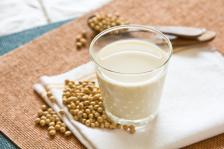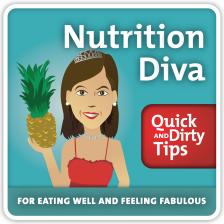Does Soy Cause Early Puberty?
How does soy affect estrogen levels? Is it safe to let your kids drink soymilk? Nutrition Diva looks at the competing claims and misinformation about soy’s effects on children’s development.
Monica Reinagel, MS, LD/N, CNS
Listen
Does Soy Cause Early Puberty?
Nutrition Diva podcast listener Kristin writes,
“My daughter struggles with acid reflux. As an experiment we replaced dairy with soy products to see if it would help. My doctor told us to switch back to dairy because he felt it was not good to give a young girl so much estrogen. I would love to hear your thoughts on this.”
.
Does Soy Contain Estrogen?
Soy does not contain any estrogen. Soy contains isoflavones, which are also often referred to as “phytoestrogens,” or plant estrogens, because the molecules are very similar in shape to estrogen molecules. So similar, in fact, that they can fit into specially shaped estrogen receptors in the surface of our cells. Eating soy does not affect estrogen levels in the body, but it may affect estrogen activity in the body – in mostly beneficial ways.
Phytoestrogens Can Block Excess Estrogen
Phytoestrogens may help mitigate the effects of too much circulating estrogen, for example, by occupying some of the estrogen receptors on our cells, thereby dampening the effect of the estrogen. This may explain why soy intake appears to be protective against breast and other estrogen-driven cancers.
Although breast cancers survivors were once told to avoid soy, it now appears that moderate consumption of soy actually reduces the risk of cancer recurrence.
This protective effect seems to be most noticeable in pre-menopausal women, which makes sense because estrogen levels are higher before menopause. And although premenopausal breast cancer is much less common, it also tends to be more aggressive – so it’s especially good to prevent it. Further studies have found that soy intake early in life, before girls hit puberty, appears to have the greatest protective benefits.
Finally, although breast cancers survivors were once told to avoid soy, just in case it might have estrogenic effects, it now appears that moderate consumption of soy actually reduces the risk of recurrence in breast cancer survivors.
Phytoestrogens May Compensate for Low Estrogen
At the other end of the spectrum, phytoestrogens may also be helpful for those with too little circulating estrogen, because it can plug into estrogen receptors that would otherwise remain empty. Although the effects of phytoestrogens are extremely weak compared to the effect of human estrogens, it may be enough to ameliorate some of the symptoms and effects of menopause, when natural estrogen production plummets.
Although the effects are somewhat inconsistent, soy intake can help lessen hot flashes and other unpleasant effects of estrogen withdrawal at menopause. And then, over the longer tem, the isoflavones in soy appear to protect the heart against some of the negative effects of low estrogen levels. Unfortunately, it doesn’t look like soy helps much with post-menopausal bone loss.
Of course, it’s always possible to get too much of a good thing……
Can You Get Too Much Soy?

See also: Soy Pros and Cons
Although researchers have looked for a link between soy intake and early puberty in boys or girls, so far, they have not found any sign of this effect. Perhaps the greatest area of concern is with infants who are fed exclusively on soy formula, because this would represent the highest possible intake of isoflavones per body weight. And even here, no negative effects have been observed. Nonetheless, I would only use soy infant formula as a last resort.
Is it Safe to Give Kids Soy Milk?
So, Kristin, let’s return to your doctor’s suggestion that giving your daughter soy milk as part of a varied diet is a bad idea. The evidence certainly doesn’t seem to support this. But the biggest irony of all is that he recommends switching to dairy because he feels that soy contains too much estrogen! And while soy contains no estrogen, cow’s milk certainly does!
Whether the amount of estrogen in cow’s milk is enough to have any effects on kids or adults is a source of some debate. However, the research to date finds that giving infants and children cow’s milk does not hasten or otherwise impact their hormonal or sexual development.
See also: Does Milk Increase Ovarian Cancer Risk? and Does Dairy Cause Breast Cancer?
Personally, I’m no more worried about moderate consumption of dairy products than I am about moderate consumption of soy. Both foods have pros and cons. At the end of the day, the most important thing is to feed our kids – and ourselves – a varied and nutrient-dense diet.
References

Chen MN, Lin CC, Liu C. Efficacy of phytoestrogens for menopausal symptoms: a meta-analysis and systematic review. Climacteric. 2014 Sep 29:1-21. Link to abstract.
Jacobsen BK, Jaceldo-Siegl K, et al. Soy isoflavone intake and the likelihood of ever becoming a mother: the Adventist Health Study-2. Int J Womens Health. 2014 Apr 5;6:377-84. Link to abstract.
Kwok MK, Leung GM, et al. Breastfeeding, childhood milk consumption, and onset of puberty. Pediatrics. 2012 Sep;130(3):e631-9. Link to abstract.
Magee PJ, Rowland I. Soy products in the management of breast cancer. Curr Opin Clin Nutr Metab Care. 2012 Nov;15(6):586-91. Link to abstract.
Messina M. Soy foods, isoflavones, and the health of postmenopausal women. Am J Clin Nutr. 2014 Jun 4;100(Supplement 1):423S-430S. Link to abstract.
Miniello VL, Moro GE, et al. Soy-based formulas and phyto-oestrogens: a safety profile. Acta Paediatr Suppl. 2003 Sep;91(441):93-100. Link to abstract.
Myung SK, Ju W, Choi HJ, Kim SC; Korean Meta-Analysis (KORMA) Study Group. Soy intake and risk of endocrine-related gynaecological cancer: a meta-analysis.
BJOG. 2009 Dec;116(13):1697-705. Link to abstract
Nechuta SJ, Caan BJ, et al. Soy food intake after diagnosis of breast cancer and survival: an in-depth analysis of combined evidence from cohort studies of US and Chinese women. Am J Clin Nutr. 2012 Jul;96(1):123-32. Link to abstract.
Soybeans vs. milk image courtesy of Shutterstock.

